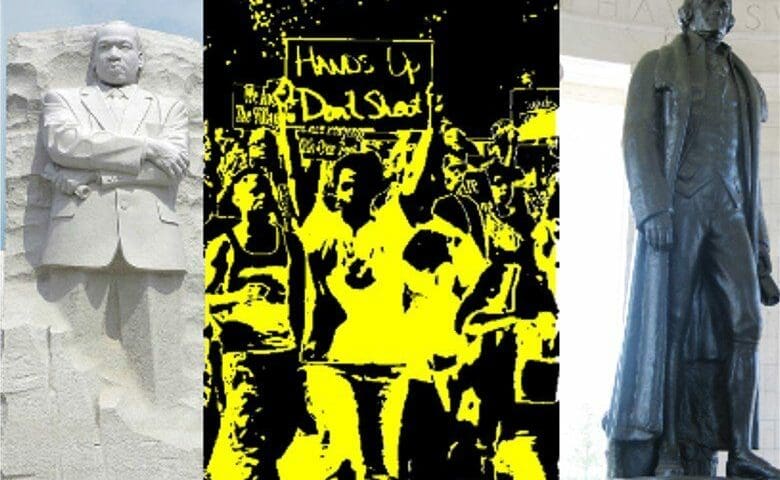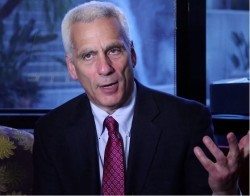

My wife Susan and I have just returned from a three-week trip to the East Coast. The journey included a week or so in Washington, D.C., which Susan had never seen and which I have not visited in a couple of decades. Our purpose was to witness the graduation of a nephew, but we also had time to visit the various monuments that cover the core of the city. These memorials invariably quote some of the masterpieces of our heritage, a reminder of the values that ground the American experiment in democracy.
We left Los Angeles as Baltimore’s social upheaval was erupting – during the same week that marked the 23rd anniversary of the so-called Rodney King riots here. It felt appropriate that on our first night, following dinner in a gentrifying neighborhood of the Capitol, a friend took us to the Martin Luther King Jr. Memorial. He said it was best seen at night,


Massachusetts’s Taxpayer Protection Act is the gold standard when it comes to ensuring government contracts are awarded fairly and will result in cost savings that don’t simply rely on slashing wages and benefits for workers. Also known as the Pacheco Law, the legislation was passed in 1993 after years of wanton government outsourcing led to drastic failures and outrageous corruption by contractors. The reckless privatization of critical services such as mental health care for Massachusetts’ most vulnerable citizens led to the creation of important standards and protections for public workers, service recipients and taxpayers.
Businesses that want to win a contract with the Commonwealth must prove they can lower costs to do the same service at the same level of quality, while providing their employees with the same wages and benefits as the public agency. A uniform process for evaluating and awarding contracts ensures conflicts of interest are rooted out while the state auditor oversees everything.
» Read more about: Taxpayer Act Threatened in Massachusetts »


The ongoing battle to restore the seven percent cut in IHSS hours provides a microcosm of the problems involved in fixing the long-term health care system in California for its most vulnerable clients.
This past January the state Senate’s Select Committee on Aging and Long-Term Care, chaired by Senator Carol Liu, issued a report titled, A Shattered System: Reforming Long-Term Care in California. Its authors concluded that seniors, the disabled, their families, caregivers and state and local governments suffer from a “costly and fragmented, ‘non-system’ of long-term care services and supports.”
A lack of political will has produced a dysfunctional system of services for the aging.
After a year-long program of research and hearings, the committee determined that continued reliance upon the existing patchwork of programs and services for the state’s growing aged and disabled population will result in “unnecessary expenditures,
» Read more about: Aging in California: Shattered Dreams, Broken Care Systems »


When Governor Jerry Brown unveiled his revised 2015-2016 budget on May 14, hundreds of thousands of In-Home Supportive Services (IHSS) recipients, the low-wage caregivers who serve them, and the health rights activists and labor unions that champion their interests learned there was an apparent seven percent solution to restore previous cuts made to IHSS service hours.
The IHSS program provides care to nearly a half-million, low-income seniors, children and persons with disabilities so they can safely live in their own homes. It is an alternative to institutionalizing the elderly and the disabled, and saves the state hundreds of millions of dollars, while enabling program recipients to receive personalized care from IHSS workers – most often family members – who assist them with hygiene issues, meals, house-cleaning, transportation and medical care.
“As of July 1st 2015, the seven percent reduction in IHSS service hours will be restored and funded by the Managed Care Organization (MCO) tax or another revenue source,” California Department of Social Services (CDSS) Deputy Director of Public Affairs Michael Weston told Capital &


Thousands of aging and disabled Californians, along with their home care providers, have been on edge to see if a seven percent cut in home care services will be restored in the state budget, as Jim Crogan details for Capital & Main. But this year’s tug-of-war at the margins of the state budget is just a foreshadowing of serious struggles to come over the next 15 years as a tidal wave of new seniors changes the face of our state.
The number of Californians over 65 will nearly double by 2030.
Despite California’s falling birth rates, the state’s population has grown faster and stayed younger than the country on average, thanks to immigration. But the outsized numbers of baby boomers has begun to outweigh those moving in, and it will leave us with a much older population.


“With great power comes great responsibility.” It’s one of those truisms that’s been echoed in various forms throughout the ages, from the likes of Winston Churchill, Franklin D. Roosevelt and even the Spider-man comics. Unfortunately, powerful major corporations like Walmart don’t often take responsibility for their tremendous impact on America and the rest of the world. As Walmart opens its annual shareholder meeting on June 5, we at the Food Chain Workers Alliance urge stockholders and executives alike to consider our newly-released report, Walmart at the Crossroads, which examines the impact of Walmart’s food supply chain on labor and the environment.
Walmart, number one on the Fortune 500 list of American companies, has net sales totaling $473.1 billion. With foodstuffs making up 55 percent of its sales, this corporation controls 25 percent of grocery sales in the U.S. Consequently, Walmart’s actions and inactions reverberate through the food chain,
» Read more about: Walmart at the Crossroads: Live Better, Do Better for All of Us »
The mass Ellis Act evictions and planned demolition of rent-controlled housing in Beverly Grove is a tragedy. Tenants and their supporters continue to protest, generating strong media coverage over the evictions being carried out by Matthew Jacobs, Chairman of the California Housing and Finance Agency. The agency’s mission is to “[support] the needs of renters and homebuyers by providing financing and programs that create safe, decent and affordable housing opportunities for low to moderate income Californians.”
L.A. is suffering from a wave of Ellis Act evictions that local officials have the ability to stop
Yes, Jacobs is a hypocrite. He has no business working for a state housing agency. And Ellis Act evictions are an outrageous circumvention of local rent-control laws.
But Jacobs would not be evicting these tenants under the Ellis Act if Los Angeles prohibited the demolition of rent-controlled housing.
» Read more about: Why Isn’t L.A. Protecting Rent-Controlled Housing? »


 In a recent interview with Capital & Main, economist Jared Bernstein candidly explained why he doesn’t see corporate America rushing to solve the country’s income disparity crisis, and why America cannot educate itself out of inequality. Instead, Bernstein, who is Vice President Joe Biden’s former top economic advisor, returned to themes found in his new book, The Reconnection Agenda: Reuniting Growth With Prosperity, In it, Bernstein lays out an ambitious agenda to restore the lost relationship between economic expansion and the well-being of most Americans.
In a recent interview with Capital & Main, economist Jared Bernstein candidly explained why he doesn’t see corporate America rushing to solve the country’s income disparity crisis, and why America cannot educate itself out of inequality. Instead, Bernstein, who is Vice President Joe Biden’s former top economic advisor, returned to themes found in his new book, The Reconnection Agenda: Reuniting Growth With Prosperity, In it, Bernstein lays out an ambitious agenda to restore the lost relationship between economic expansion and the well-being of most Americans.
In this podcast he acknowledges the Obama administration’s missed opportunities during the early days of the last recession, while claiming that the present political dysfunction, with its gridlock of federal legislation, is not an accident but a political strategy that serves the status quo and is the enemy of full employment.
» Read more about: Podcast: Jared Bernstein Talks About the Recession, Unions and the TPP »
As it states on its website, “for more than 35 years, the California Housing Finance Agency (CalHFA) has supported the needs of renters and home buyers by providing financing and programs that create safe, decent and affordable housing opportunities for low to moderate income Californians.” But now some apartment dwellers in Beverly Grove and the Fairfax District are wondering whether the agency’s chairman, Matthew Jacobs, has forgotten— or perhaps, never really embraced—the noble purposes expressed in the state agency’s mission statement.
A state housing chief is using the Ellis Act to evict his tenants
Jacobs has sat on the board since 2012 and was designated chair by Governor Jerry Brown in December, 2013. He has an extensive, accomplished background in real estate finance and development, and is the Principal at Bulldog Partners, LLC., a real estate development company that is now in the process of using the Ellis Act to evict 17 tenants from four rent-regulated buildings,
» Read more about: Mass Evictions Spread to Fairfax District »


Some 70 years ago, the song “Rosie the Riveter” crackled over the wireless while a Norman Rockwell illustration of Rosie flexing her bicep popped from the cover of The Saturday Evening Post. By depicting the rivet gun-toting icon on her lunch break, Rockwell hopped aboard the government-fueled propaganda bandwagon that had only one aim: to recruit and train a female workforce capable of churning out munitions, aircraft, tanks and destroyers for a costly, brutal war that spanned two oceans and three continents. Rosie the Riveter did the job, and an estimated 18 million women left the house for the factory (or shipyard) — giving many the freedom to work outside the home for the very first time.
The larger the share of female employment, the lower the wage across all industries
Today,
» Read more about: A New Rosie the Riveter for a New America »